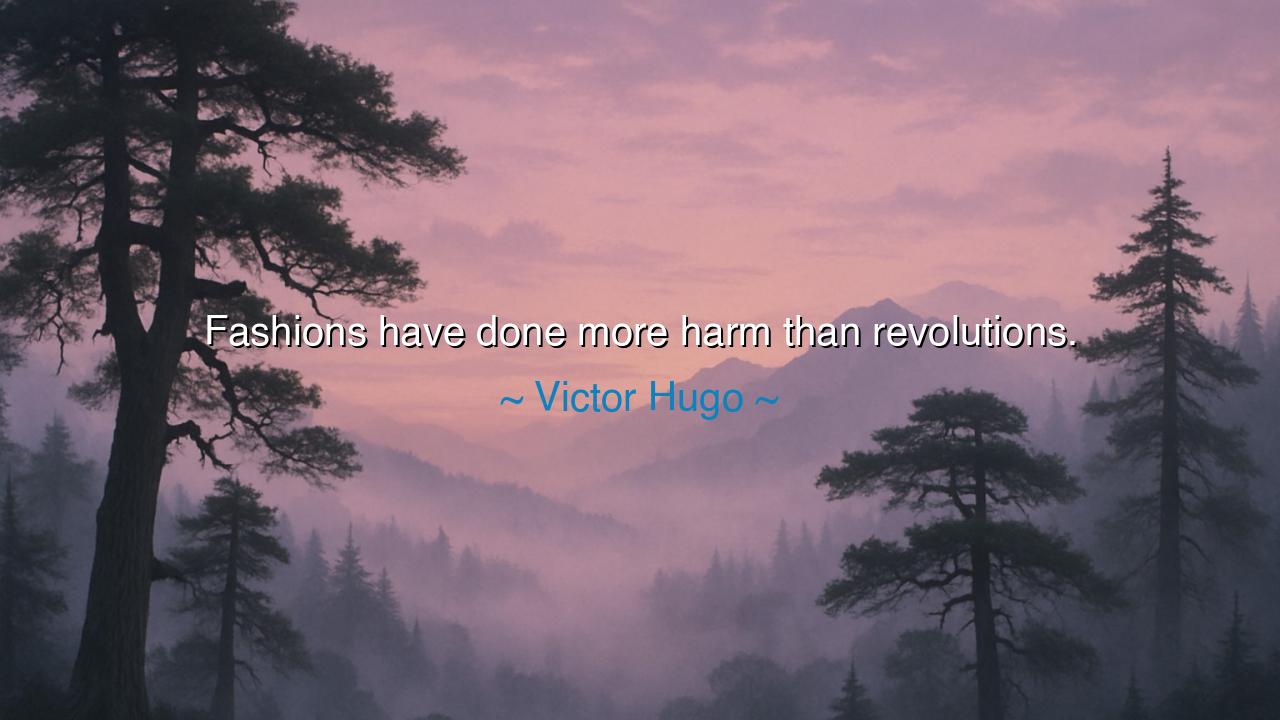
Fashions have done more harm than revolutions.






In the ever-evolving journey of human civilization, there are forces that shape our societies—some are bold, dramatic, and transformative, while others are subtle, persistent, and often deceptive in their influence. The words of Victor Hugo, "Fashions have done more harm than revolutions," offer a reflection on the nature of change and its consequences. At first glance, this statement may seem paradoxical—how can something as seemingly harmless as fashion be more destructive than the rebellions and wars that shape the very fabric of nations? Yet, within this statement lies a powerful truth about the nature of human vanity, conformity, and the ways in which superficial desires can alter the course of history.
To understand the depth of Hugo’s words, we must consider the ancient world, where change was often heralded by revolutions—moments of great upheaval that sought to transform the very structures of society. The Greeks, in their pursuit of freedom and democracy, witnessed the rise of tyrants and the overthrow of rulers. Yet, even as these revolutions brought about tangible political change, they were often followed by periods of instability and bloodshed. While revolutions may have shifted the power structures, they also left behind a legacy of violence and division, causing irreversible harm to the societies that experienced them. Hugo’s point, however, lies in the fact that fashions, though seemingly less violent, can insidiously infiltrate the very essence of a society, eroding its core values and guiding principles.
The Romans, for instance, had their own form of fashion, from the grand togas of the ruling class to the fine garments that adorned the emperor. These symbols of wealth and status played a significant role in maintaining the hierarchical order of their society. Yet, as the Roman Empire expanded, its obsession with luxury and appearance grew to an excessive degree. The Roman emperors—like Nero and Caligula—were often more concerned with their personal image and indulgence than the well-being of the empire. The obsession with fashion and luxury became a distraction that ultimately contributed to the decline of Roman society. In this way, the superficial nature of fashion did more harm than any revolution could—undermining the strength and moral fiber of a once-great civilization.
Hugo’s warning also brings to mind the French Revolution, a moment in history marked by violent upheaval and the destruction of the old order. The revolutionaries, though they sought to liberate the people from the oppressive rule of the monarchy, ultimately gave rise to another form of tyranny—one defined by the Reign of Terror. In the chaos that followed, ideals like freedom and equality were often overshadowed by the destructive forces of anger and revenge. The aftermath of the revolution revealed that while revolutions could bring about political and social change, they were rarely without cost—in lives, in values, and in the very fabric of the society that gave birth to them. In contrast, fashion, in its subtle yet pervasive influence, continues to dictate the minds and hearts of societies across the ages, often with far-reaching consequences that are not immediately visible.
Consider the modern world, where fashion dictates not only how we dress but how we think, how we interact, and even how we define ourselves. The rise of consumerism has given fashion an unprecedented power over human identity. In every corner of the globe, people are encouraged to conform to ever-shifting trends—whether in clothing, technology, or lifestyle. This obsession with appearance has led to shallow definitions of success and worth. The relentless pursuit of status through fashion often leaves people empty and disconnected, leading to a society where value is placed on the external, and the deeper qualities of character are neglected.
In the light of this, Hugo’s words serve as a reminder to future generations: fashion, in its many forms, can be a subtle poison that undermines the spiritual and moral health of a society. It diverts our attention from the important—the cultivation of the inner self, the pursuit of virtue, and the development of true wisdom—toward the fleeting and the superficial. Just as the Romans and the French Revolutionaries became consumed by their obsessions with appearances and symbolic victories, so too can we lose our way if we allow the tide of fashion to pull us into its shallow depths.
The lesson, then, is clear. We must learn to value what is lasting and genuine, to recognize that the most significant changes in life come not from the ever-shifting whims of fashion, but from deep, inner transformation. Whether through revolution or the pursuit of personal growth, true progress is rooted in the timeless virtues of honesty, integrity, and courage. Let us not be swayed by the tides of superficial trends, but let our lives be defined by the eternal truths that uplift humanity. In doing so, we will create a world where the harm done by the superfluous will no longer hinder our true progress.






AAdministratorAdministrator
Welcome, honored guests. Please leave a comment, we will respond soon